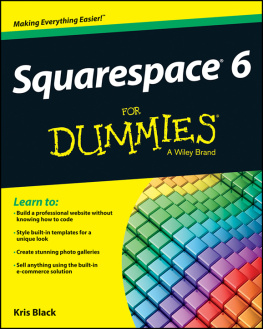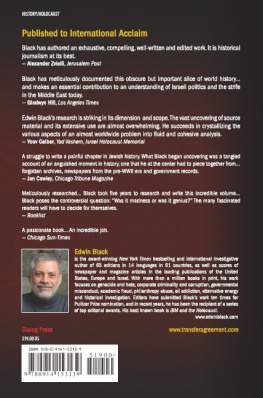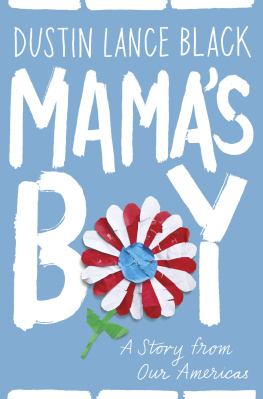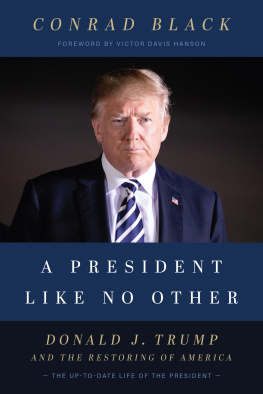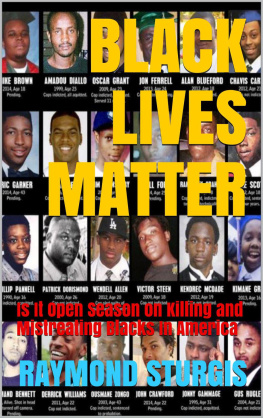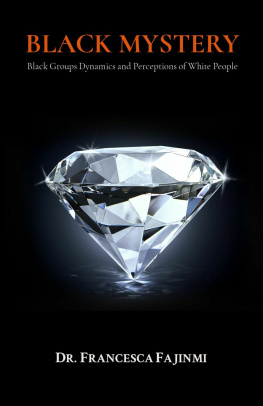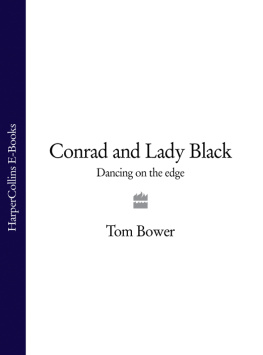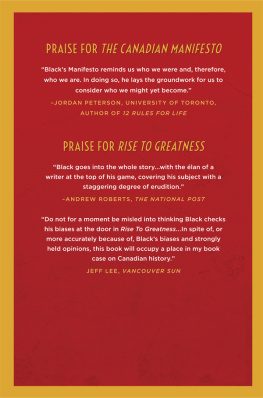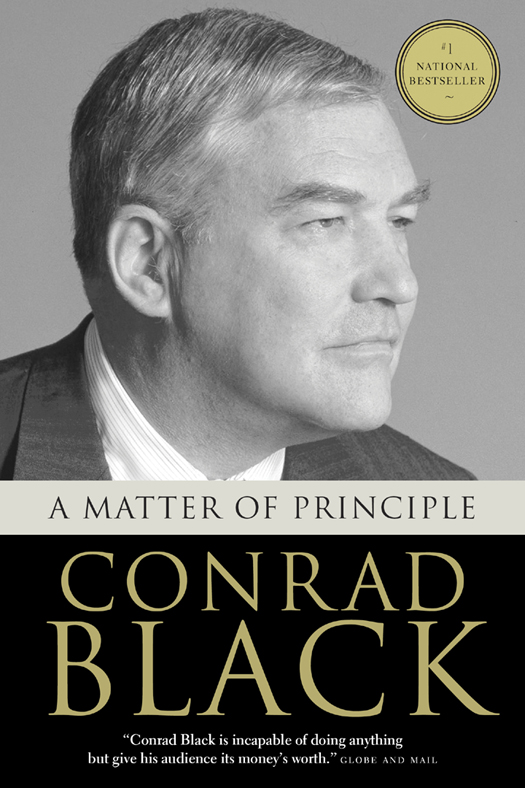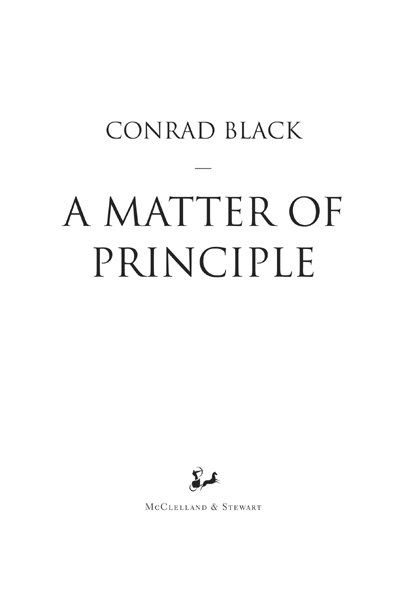A DVANCE P RAISE
When a great writer is falsely imprisoned for a crime he didnt commit and decides to write a tell all non defensive account, the result is likely to be riveting. Conrad Blacks memoir does not disappoint. With his characteristic verve, turns of phrase and brilliant insights, Black puts his persecutors on trial. I am confident he will win the verdict of history.
ALAN M. DERSHOWITZ
Conrad Blacks A Matter of Principle is a fascinating, erudite, and defiant prison memoir must-read for lawyers, politicos, and gossips alike!
MARGARET ATWOOD, on Twitter
Conrad Black is back and its payback time, Jack!
TOM WOLFE
Compellingly readable, A Matter of Principle is partly a witty high-society memoir, partly a business book, partly a searingly-argued case for Blacks defence, partly a moving love-story, and partly a polemic explaining the death of his once profound admiration for the USA. What it is emphatically not is an apologia, but instead more a case for the prosecution of what he calls Americas prosecutocracy.
ANDREW ROBERTS
Written with high indignation but without so much as a drop of self-pity, and tempered by his characteristic panache, eloquence, and wit, A Matter of Principle is Conrad Blacks account of how and why he was toppled from his position as one of the great newspaper publishers of the day and then sent to prison on charges of which he was innocent. It is a fascinating, illuminating, and in some ways a horrifying story that should and hopefully will repair the damage that has so unjustly been done to his reputation.
NORMAN PODHORETZ
Conrad Black, who writes vigorous, muscular prose, relishes the fact that writing can be a way of fighting. In his spirited memoir, this pugnacious man of many accomplishments tells a fascinating story of, among other things, the prosecution of him that got the disapproving attention of the U.S. Supreme Court.
GEORGE F. WILL
You hold in your hands a vivid account of what has become a crucial threat to the American way of life: Class warriors of the Left enlisting all-powerful prosecutors to demonize and destroy successful entrepreneurs and executives. The injustices reach well beyond the targeted executives and result in widespread collateral financial damage to likewise innocent investors and shareholders, who also pay a steep price. This is an important, captivating account, lived and recounted by one of the sharpest minds of our time: Conrad Black.
RUSH LIMBAUGH
ALSO BY CONRAD BLACK
Render Unto Caesar: The Life and Legacy of Maurice Duplessis
A Life in Progress
Franklin Delano Roosevelt: Champion of Freedom
The Invincible Quest: The Life of Richard Milhous Nixon
Copyright 2011 by Conrad Black Capital Corporation
All rights reserved. The use of any part of this publication reproduced, transmitted in any form or by any means, electronic, mechanical, photocopying, recording, or otherwise, or stored in a retrieval system, without the prior written consent of the publisher or, in case of photocopying or other reprographic copying, a licence from the Canadian Copyright Licensing Agency is an infringement of the copyright law.
Library and Archives Canada Cataloguing in Publication
Black, Conrad
A matter of principle / Conrad Black.
eISBN: 978-1-55199-316-4
1. Black, Conrad. 2. Newspaper publishing Canada Biography.
3. Capitalists and financiers Canada Biography. 4. Businessmen
Canada Biography. I. Title.
PN4913.B56.A3 2010 070.5092 C2008-901956-3
We acknowledge the financial support of the Government of Canada through the Book Publishing Industry Development Program and that of the Government of Ontario through the Ontario Media Development Corporations Ontario Book Initiative.
We further acknowledge the support of the Canada Council for the Arts and the Ontario Arts Council for our publishing program.
Library of Congress Control Number: 2011935307
Cover photograph: Peter Bregg
McClelland & Stewart Ltd.
75 Sherbourne Street
Toronto, Ontario
M5A 2P9
www.mcclelland.com
v3.1
To Barbara, my indomitable, unofficial co-defendant, and my daughter Alana and sons Jonathan and James; to my dear friends June Black, Dan Colson, Midge Decter, David and Murray Frum and Nancy Lockhart, Roger and Susan Hertog, Laura Ingraham, George Jonas, Roger Kimball, Seth Lipsky, Joanna MacDonald, Joan Maida, Brian Mulroney, Norman Podhoretz, Andrew Roberts, William Shawcross, Brian Stewart, Bob Tyrrell, and Ken Whyte; and to Rob Jennings, and other friends in the prison to which I and many of them were unjustly sent; and to all others who have sustained and encouraged me in this difficult time, including thousands of strangers in many lands. All in their different ways have been magnificent. I will never forget their encouragement and will try to repay, or at least justify, their kindness.
R AVELSTON , A RGUS, AND H OLLINGER
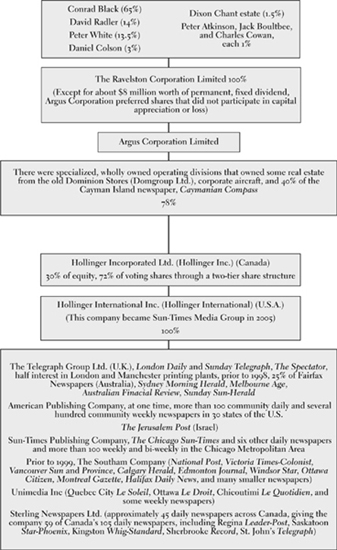
[C ONTENTS ]
[C HAPTER O NE ]
M ARCH 2010: C OLEMAN F EDERAL C ORRECTIONAL C OMPLEX , F LORIDA
I sleep in a cubicle that shares a ceiling with sixty other identical spaces, rather like partitions in an office, except that these are painted cinder block and there are no potted plants. At 10:30 p.m., the ceiling lights placed every twenty feet or so go out. The residents turn out their cubicle lights, leaving only an overhead row of red, dimly lit panels, pierced here and there by the beam of portable reading lamps, which enable the readers among us to escape into books, letters, newspapers, snapshots, and tokens and reminders of the world beyond the gates. In the morning, daylight creeps past the condensation generated by the confrontation between the Florida heat and the fierce air conditioning of the Federal Bureau of Prisons into the outside cubicles through narrow rectangular windows grudgingly set in the concrete walls.
Here, we concern ourselves with how many postage stamps (the local currency) are needed to buy an extra notepad. We see and hear the talking heads on tele vision in the activities room or, in my case, read in the newspapers of the steady failures or crises of great institutions: AIG , General Motors, Citigroup, the State of California, the New York Times, the Harvard University Endowment. How could this country have become so incompetent, so stupid, and why was this debacle so unforeseen? The pundits have the usual uninformed answers, not greatly more well thought out, and less entertaining, than those of some of my fellow residents. Lying in my bunk after the lights have gone out, I reflect on the ludicrous demise of my great love affair with America.
Bemused by the economic and political shambles, created largely by people I have known, I fight on from this absurdly shrunken perimeter for recovery of my liberty, reputation, and fortune. I still expect to win.
My prison number, 18330-424, is stamped on my clothes and mandatory on all correspondence. I am sixty-five years old. I entered these walls a baron of the United Kingdom, Knight of the Holy See, Privy Councillor, and Officer of the Order of Canada, former publisher of some of the worlds greatest newspapers, and author of some well-received non-fiction books. In December 2007, a courteous federal district judge in Chicago sentenced me to seventy-eight months in a federal prison and imposed a financial penalty of $6.2 million. This is all winding its way through final appeals and is completely unjust, but so are many things. I was convicted of three counts of fraud and one of obstruction of justice, of all of which I am innocent. Three charges were dropped and nine led to acquittals. I have gone through but survived straitened financial circumstances, have sold two of my homes, and am responding to and initiating endless civil litigation. For the last six and a half years I have been fighting for my financial life, physical freedom, and what remains of my reputation against the most powerful organization in the world, the U.S. government.


